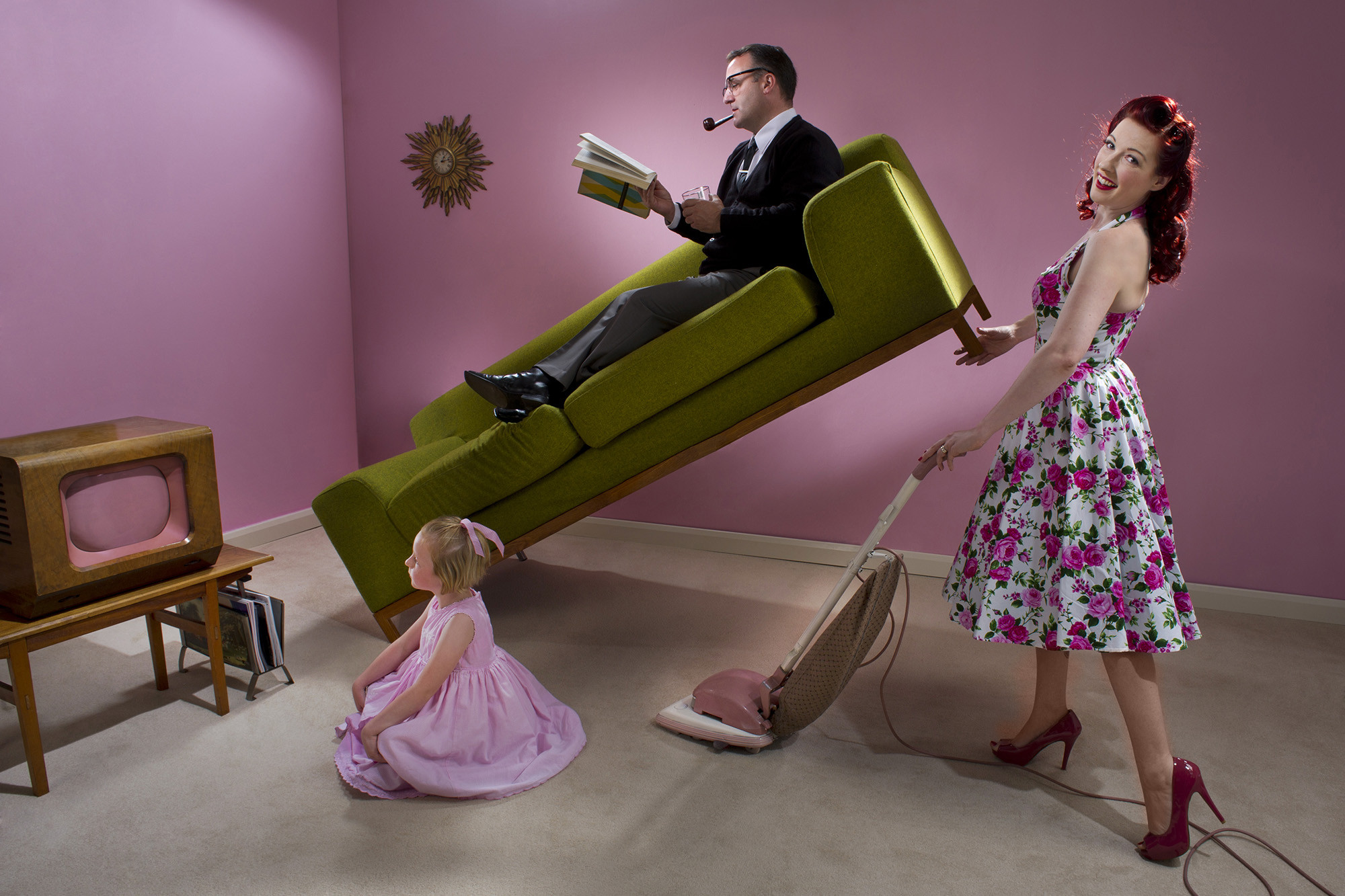From Have It All Feminism to Tradwife Influencers, Women Are Being Given Impossible Ideals and Taught to Refuse Limitations
Earlier this month in UnHerd, Mary Harrington profiled Lauren Southern’s move from former ‘tradwife’ to almost-feminist in “Lauren Southern: how my tradlife turned toxic.” She, deceived by a man she met online, fell into a life of abuse and heartbreak. Harrington attests that Southern is just one of many ‘online’ women who have succumbed to the promises of ‘listicles’ and then been duped into a life of oppression. For her, this testifies to the truths of feminism and the need for women to safeguard themselves from similar fates.
Perhaps the first step away from the broken promises of feminism is to admit that they always were, and continue to be, impossible.
Harrington only tells half of the story. Tradwifery, for all its frills, gets at a rising discontent in women who have abandoned the promises of feminism for what is perhaps the idealistic life of huswifery. Beneath the prairie dresses and sourdough recipes is a genuine desire to be provided for, to have children, and to make a warm and hospitable home. For all the decadence of this age, our wealth must come with some silver linings. The fact that a woman may not have to sacrifice her best years to an office desk, pay high rent, and subject herself to years on years of sexual exploitation should at least deserve some respect.
Radical feminism, Liberal feminism, Eco-feminism—modifiers for feminism abound. But beneath the layers of history and modification is a genuine desire for clarity. Ten years ago, Roxanne Gay attempted to explore the internal contradictions of feminism in her book Bad Feminist:
I am failing as a woman. I am failing as a feminist. To freely accept the feminist label would not be fair to good feminists. If I am, indeed, a feminist, I am a rather bad one. I am a mess of contradictions.
There are many ways in which I am doing feminism wrong, at least according to the way my perceptions of feminism have been warped by being a woman.
I want to be independent, but I want to be taken care of and have someone to come home to. I have a job I’m pretty good at. I am in charge of things. I am on committees. People respect me and take my counsel. I want to be strong and professional, but I resent how hard I have to work to be taken seriously, to receive a fraction of the consideration I might otherwise receive. Sometimes I feel an overwhelming need to cry at work, so I close my office door and lose it.
I want to be in charge, respected, in control, but I want to surrender, completely, in certain aspects of my life.
What Gay goes on to describe in her “Bad Feminist Manifesto” seems appealing; women can essentially fashion feminism in their own images. She paves the way for a puzzling possibility of trad-feminism (whatever that is). What she doesn’t account for is the women who may not want to be feminists at all. Is it possible to modify feminism so much that it ceases to be feminism at all?
Perhaps Gay’s bad feminisms naturally give way to antifeminism, the 80s and 90s’ response to Betty Freidan’s Feminine Mystique, wherein she unhelpfully characterizes the housewife’s ennui “the problem that has no name.” Camille Paglia, Elizabeth Fox-Genovese, and Helen Alvare advocated for men while still identifying the unique “feminine genius” and the due protection they were owed. Perhaps their thought precedes the eventual necessity of a new modifier: impossible feminism, which negates the need for feminism, admitting that its trial period has ended and what follows will be a necessary restoration to somewhat more traditional gender norms. Trad feminity, like toxic masculinity, is easily caricatured. But what’s hidden behind that impulse is something true: sex calls every human being to reckon with his ultimate purpose in this life.
It’s helpful to return Harrington’s article tag, ‘The Online Ideology Doesn’t Work in the Real World.’ Tradwifery, often as extreme and performative as feminism, doesn’t work in the real world. The promises of feminism—total autonomy, economic success, true equality—will never be realized this side of heaven. Women who insist so embroil themselves in an endless power struggle with men and society. There are true ‘wins’ in this struggle, only varying degrees of loss. Children often lose out the most. You can have as much autonomy as you desire, you just have to negotiate it with your 2 year old.
Perhaps the first step away from the broken promises of feminism is to admit that they always were, and continue to be, impossible. Harrington herself has admitted this fact: you can’t have it all (say, a beach bod, three children under 4, a 50 hour-a-week career, and free childcare). There are sacrifices to be made, but sacrifices often sound, to modern sensibilities, like concessions, like loss. To admit one’s limitations is actually a courageous act of surrender.
Tradwives Are Ditching The Workplace For The Home
I delayed the writing of this column to hang out a basket of washing. I was just about to weigh into the “trad wife” debate, and lament the alarming popularity of online influencers advocating the joys of being a dutiful and submissive homemaker, when I discovered that someone had just taken someone else’s washing out of the machine and dumped it on the kitchen table to go smelly and rank.
I can’t say I did it with a smile, like the “trad wife queen” Hannah Neeleman, whose interview with this paper last month caused such a stir, but I have to admit there’s something satisfying about pegging out clean laundry on an old-fashioned clothesline strung between two trees on a sunny morning. If I was on Instagram or TikTok, I might even have filmed the sheets and knickers billowing Instagrammably in the breeze.
Had I done so, however, I would have been undermining decades of progress on gender equality, sending a regressive and damaging message, and harming my own mental health in the process. So says the Irish mental health charity Turn2Me, which last week issued a statement expressing its concerns about the growing popularity of the social media trend which encourages women to forsake the workplace and embrace domestic roles.
By glorifying the idea that women should prioritise homemaking over careers or personal ambitions, the trend challenges the strides made towards equality, according to Turn2Me. “This messaging suggests women’s empowerment is less valuable than fulfilling traditional roles, which can hinder progress in achieving equal opportunities for all genders.”
Moving swiftly on from the reference to “all genders”, rather than just the boring old two, I thought we’d already had this debate? Didn’t we even have a vote on it, last March, in which almost 75 per cent of the population affirmed the constitutional recognition of women’s work in the home, and resoundingly rejected the suggestion by their betters in politics and the commentariat that this work was demeaning, worthless and reductive?
But no, it seems we will never be done with lecturing each other on the right and wrong ways to “do” being a woman. And it still appears inconceivable to some that there are women who consider that homemaking is actually a career, one that can even qualify as a “personal ambition”. In its statement, Turn2Me warned that outdated and harmful stereotypes can “reinforce the notion that a person’s worth is tied to their adherence to traditional gender norms, rather than their unique skills, talents, aspirations and contributions to society”.
But what if your unique skills, talents and aspirations find sufficient fulfilment in running a home, cooking meals from scratch and raising well-rounded individuals, and you dare to consider that a contribution to society? Or do women only contribute to society when they go out to compete with men in the external workforce — before coming home to do the child-rearing, meal-cooking and laundry-hanging?
I suspect that most women, watching these online “trad wives” extolling the joys of their homemade sourdough and their home-schooled children, are smart enough to see this trend for what it is: a trend, a fleeting online fantasy that’s about as realistic and achievable as Kim Kardashian’s bum (which “broke” the internet some years ago) or the “brat summer” lifestyle (this year’s Barbiecore, look it up).
It’s really not so different from the “domestic goddess” shtick invented all of 24 years ago by the equally realistic and relatable Nigella Lawson. A couple of years ago, there was a similar trend for home cleaning hacks, tips and products, which sent certain brands of unloved and long-forgotten cleaning potions flying off the shelves. I discovered a bottle of the scented disinfectant Zoflora — was it half-full or half-empty? — in the back of a kitchen drawer recently and remembered that it was supposed to change my life. I didn’t realise I was setting back the cause of female equality by devouring videos of a maniacally grinning woman scouring her overflow.
They’re also smart enough to see the inherent paradox in the “trad wife” phenomenon: these women supposedly living a Little House on the Prairie existence are actually producing lucrative content on social media and earning a fortune from pretending to be postwar housewives. Neeleman is a shrewd businesswoman, married to the multimillionaire heir to an aviation fortune and basically the Gwyneth Paltrow of down-home domesticity: you too can buy into her “surrendered-wife” dream by purchasing a sourdough kit for €83, a bag of plain flour for €14, a €50 apron or a box of baked goods for €138 from her Ballerina Farm website.
I’m not convinced that mental health charities really need to worry about Irish women buying wholesale into the “trad wife” trend just because they’ve tuned into “the real housewives of the internet” and fleetingly considered keeping hens. But nor is it helpful to diminish the value of domestic work, or to suggest that it can never be a fulfilling activity or a worthwhile lifestyle option: I reckon we’ve made our views clear on that point.
Most of us don’t have a choice about going out to work and managing a household too, and sometimes the notion of being able to focus simply on the never-ending domestic tasks, and finding satisfaction in doing them well, sounds like a luxury rather than a drudge. It really shouldn’t count as an act of treachery to admit that. The “trad wives” message is to elevate domesticity to an endeavour in which you’re entitled to take pride, rather than feeling shamed and traitorous for getting a kick out of baking your own bread or taking in air-dried laundry. Speaking of which, I’d better wrap this up, because it’s starting to look like rain…
Tradwives: A Movement or a Trend?
Tradwives are women who value being a traditional wife, subscribing to homemaking and conventional gender rules. Notable tradwives like 22-year-old former model Nara Smith and TikTok star Estee Williams can be seen cooking, cleaning and showcasing their picture perfect lives as stay-at-home moms. “But we also can be entrepreneurial from home,’’ added O’Toole. “I also save money on child care by staying home with my kids,’’ according to O’Toole.
The average price for one child in daycare in the U.S. was $11,582 last year, a 3.7 percent increase from the prior year, the Labor Department reported. And the cost of child care is expected to skyrocket, squeezing parents who are already struggling with high inflation that impacts food, rent and fuel costs.
Besides a cultural motivation, some women are choosing to stay-at-home because of the continuing increase in child care costs, according to Karen Litzinger, owner of Litzinger Career Consulting in Pittsburgh, Pa. “Working outside the home is not as cost-effective,’’ Litzinger said.
Having worked with and led programs on women re-entering the workforce and learning about the alarming statistics of women living in poverty, it would be wise for women to gain some type of training credential in case the fairy-tale marriage and lifestyle come to an end, said Litzinger. “Some of my younger clients choose careers that have more options of working part-time or going in and out of the workforce.,’’ said Litzinger.
Ivy Van Dusen, a stay-at-home mom and self-proclaimed “tradwife’’ says she always dreamed of motherhood. She juggles her domestic duties as a mom of two sons with content creation, running a TikTok page with more than 100,000 followers.
Despite the Tradwife success story, there is still some debate as to whether it is a movement.
“I don’t think it’s a movement in a political sense or that it’s anything new,’’ said Carrie Sheffield, a senior policy analyst at the Independent Women’s Forum. “It’s simply a digital expression, a modern communication of a pre-existing phenomenon,’’ according to Sheffield.
Sheffield points out that Tradwives is a more grassroots, online expression of a traditional, old-school, printed glossy magazine like “Good Housekeeping” or “Better Homes and Gardens.”
“What has prompted the tradwife visibility is the rise of a digitially-native generation entering adulthood combined with a mixture of fascination, admiration, “hate chicks’’ and envy,’’ said Sheffield.
Still, researchers question how long the tradwife trend will endure. Sheffield again emphasizes that tradwivies is not a trend, but a digital expression of an ancient philosophy of prioritizing motherhood/domestic life over traditional employment outside the home.
“The fact that the hashtags around this expression are growing speaks to a combination of women connecting with women and algorithms favoring them for now,’’ said Sheffield. “I do think that the beauty of marriage and motherhood is timeless so no matter where the algorithms trend, promoting stable families will always be in style,’’ added Sheffield.
More than 56 percent of American women are in the workforce – a number significantly higher than in the 1950s, according to the U.S. Bureau of Labor Statistics. Statistics also show that in 2017, 54 percent of all U.S. households had two incomes, compared to 26 percent in 1955. In addition, more than 80 percent of single parents are women.

















